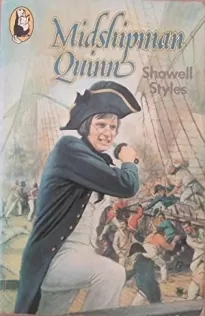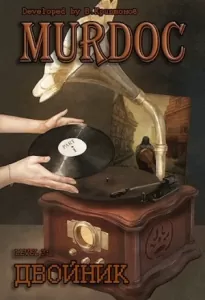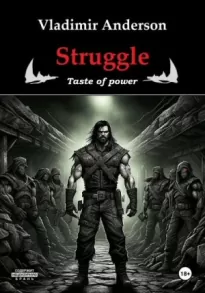Midshipman Quinn

- Автор: Showell Styles
- Жанр: Исторические приключения / Морские приключения
- Дата выхода: 1956
Читать книгу "Midshipman Quinn"
— 2 —
"Ar," said old Lambie the carrier, flicking his whiplash at the ear of his aged horse as they clattered along the dusty lanes. "So you be away off to fight they Frenchies in a King's ship. Ar."
"In a frigate, Lambie, not a battleship," corrected Septimus.
"Ar," said Lambie. "Well, you be mortal young, Master Sep. But Lord Nelson, he were younger nor you when he jined as a midshipman, so you keep a-goin' and mebbe you'll end up a lord."
The carrier's cart was bearing Mr. Midshipman Quinn to Petersfield, where he would get the Portsmouth coach. It was a sunny morning towards the end of July, two days after the arrival of the letter from the Admiralty.
Those two days had been busy ones at Linton Abbott Rectory. Septimus had to be outfitted for his new career, and only the fact that the tailor at Alton was Mrs. Cattermole's brother-in-law had enabled two blue coats of regulation pattern to be completed in the time. The white breeches and stockings and buckled shoes Septimus already possessed. A retired naval lieutenant with a wooden leg, who lived in the parish, had advised as to the cut of the coats and the style of cocked hat to be worn, and had even given Septimus the dirk he had worn as a midshipman. Septimus himself had constructed the small but stout sea-chest, with his name on it, which was now stowed behind him in the carrier's van. He was fully equipped with everything-except knowledge of ships and the sea.
Before he died, Mr. Charles Quinn had contrived to have his son's name placed on the books of one of His Majesty's ships as a midshipman, which privilege he was able to obtain without difficulty because of his distant relationship to William Pitt, now Prime Minister of England. It was quite a common arrangement for this to be done, and it gave extra seniority; Septimus Quinn would have over a year's seniority as midshipman before he even set foot on board a ship. But though boys were sometimes "borne on the books" for years, often while they were still at school, without being appointed to a seagoing ship, in time of war they were likely to be called up at very short notice. And this had happened to Septimus.
As the carrier's cart rumbled through Selborne and out into the sunlit lanes towards Greatham, Septimus Quinn had every reason for feeling unsettled and anxious about his future. He was not, in his own opinion, a fighter. The only boat he had ever been in was an ancient punt on a lake near Linton Abbott. Yet here he was, setting forth to go to sea in a fighting frigate with two hundred shipmates who were all strangers to him. But Septimus, it will have been noticed, was of a philosophical turn of mind. With no brothers and sisters, and — after his father's death — no real friends, he had learned to be self-sufficient and independent. He had also developed a knack of being interested in everything that came his way and finding out what he could about it, whether it was a lump of sulphur or a gypsy conjuror. So in spite of the perils and adventures that undoubtedly lay ahead of him he was neither afraid nor particularly excited. On the whole, he would have preferred to stay at Linton Abbott and do some more research into the remarkable properties of Potassium Chlorate when united with Sulphur; but he was prepared to be interested in fighting the French now that it was to be his profession.
"See them there?" demanded old Lambie suddenly, pointing with his whip to a small company of men marching raggedly across a field beside the lane. "Volunteers, they calls 'em. Drilling to fight Boney if he crosses the Channel, they are. Volunteers! Ar!" He spat to show his opinion of them. "Rapscallions, I calls ' em!"
"Why so? asked Septimus politely.
"Why? 'Cause half of 'em's thieves and vagabonds what's jined for the bounty they pays, two golden guineas! Most on 'em desert when they've got the money and turns thief or footpad. I tell ee, Master Sep, there's been coaches stopped, and that not far from here, by those gentry!"
"Highwaymen, you mean."
"Ar. — Cummup!" Lambie flicked his whip at his old horse. "Last week the Lunnon coach were stopped, Guildford way. Wouldn't surprise me if they black rascals tried their tricks on me some day. Ar!"
"Would you fight if they stopped you?" asked Septimus.
"Who — me? That I wouldn't!" said Lambie emphatically. "And if ever you're in a coach what's held at pistol's point by they toby-men, Master Sep, you sit quiet and do as they tell you. That's my advice. 'Tis a hanging matter to stop a coach on the King's highway, so if they have to shoot they shoot to kill. Ar!"
"I don't think I'd like to sit quiet in those circumstances," remarked Septimus thoughtfully.
"No — and you'd not like to lie quiet with a pistol-bullet in you, neither! — Cummup!"
There was a very bumpy piece of road just before they rattled into Greatham, and as the cart lurched into one particularly deep hole Septimus was flung with some force against the rail at the side of his seat. He thrust his hand into his coat-pocket just in time to prevent the thing that lay there from being crushed.
"Hallo!" said Lambie. "Carrying eggs in your pocket, Master Sep."
"One egg, Lambie," replied Septimus solemnly. "And it's a glass one, too."
The carrier guffawed at what he thought was a joke. But the thing in Septimus's pocket was indeed made of glass, and about the size and shape of a pigeon's egg. Septimus had made it himself the previous evening. It represented a further stage in his chemical experiments, and he was hoping to test it when he got a moment to himself.
Lambie, who was a simple soul, chuckled over the "glass egg" joke all the way to Petersfield and was still chuckling when he pulled up outside the Red Lion Inn. Petersfield was on the main London-to-Portsmouth road twenty miles from Portsmouth — two hours' going for the London Mail coach. Lambie helped Septimus get his sea-chest onto the porch of the inn and then bade him farewell.
"London coach'll be here in an hour, if she's up to time," he said. "Your uncle told me he'd an inside place reserved for you. So you've time for filling your belly, Master Sep-and my advice is, fill it well. You'll have nowt but salt beef and rotting biscuits once you go to sea!"
Septimus shook hands with him and then went into the inn. It must be admitted that he felt, for the first time, rather lonely; old Lambie the carrier was the last link with Linton Abbott Rectory and the Reverend Theophilus and Mrs. Cattermole — with Home. But no one would have suspected that the small figure in white breeches and blue coat who entered the coffee-room so confidently was feeling anything but perfectly calm. There were several people in the raftered coffee-room, eating at the long table in the window. Septimus took a vacant chair and, when he had ordered the "ordinary" dinner from the waiter, turned his gaze on his companions. There were two men who looked like farmers, eating steak-pudding noisily; a well-dressed lady in cloak and bonnet, with her daughter, a pretty girl of about Septimus's age; and, at the end of the table opposite Septimus, a tall, bony gentleman with a red face and bulging blue eyes, clad like Septimus in white breeches and blue uniform coat but with a great deal of gold braid on his coat-sleeves. It hardly needed the straight sword and cocked hat lying on the window-seat to tell Septimus that this was a real naval officer.
The old wooden-legged lieutenant at Linton Abbott was the nearest approach to a sea-officer of the British Fleet that Septimus had ever seen, and it is possible that his steady grey eyes remained fixed on the red-faced officer rather longer than was polite. It soon appeared that the officer thought so.
"Hah!" he said suddenly, glaring back at Septimus. "Don't think I've the honour of your acquaintance, sir!"
His voice was like the rasping of a file a thousand times magnified, thought Septimus.
"No, sir," he admitted.
"But by Hector, you're determined to know me when we meet again!" rasped the officer. "Hah! Hah-hah-hah!"
He appeared to think that he had made a particularly good joke. Septimus observed that the girl was smiling, and decided that he didn't like the red-faced gentleman.
"Hah-hah-hah!" he responded.
On the face of it, he seemed to be politely joining in the laugh.
But in Septimus's laughter there was just the suspicion of an echo of the red-faced officer's horse-Iaugh - faint indeed, but enough to make that gentleman go a deeper red and glare wrathfully, while the girl buried a fit of giggles in her handkerchief. Perhaps fortunately, the waiter provided a diversion by arriving at that moment with a plate of steak-pudding for Septimus, and the meal proceeded in a silence broken only by the lusty gobbling of the two farnlers.
Septimus, remembering Lambie's advice, dealt heartily with the Red Lion's excellent pudding. As he ate he reflected with satisfaction that he had not altogether lost the accomplishment of mimicry. Six months ago one of his peculiar studies had been the imitation of the voice of every bird and beast, and most of the human inhabitants, of Linton Abbott.
Presently the red-faced officer got up, and with a final glare at Septimus went into the taproom, where he could be heard shouting ill-temperedly for wine. A little later the landlord of the Red Lion came into the coffee-room.
"Ladies and gents," he said, wiping his hands on his apron, "by your leave, London coach is doo in ten minutes."
"Landlord!" called the lady, as he was turning to go. "A word with you— Is it true that mail coaches have been robbed on the Portsmouth road lately?"
"We-e-ell," replied the landlord hesitatingly, "it's true there's been a bit of trouble, now and again, with the toby-men. But you've no call to be afeard, ma'am," he added quickly. "The guards on all the London Mails is armed with blunderbusses, since last Toosday. What's more, you'll be safe in Portsmouth by six o'clock in the evening and them rascals don't usually pull their flash tricks by full daylight."
"Thank you," said the lady. "I am not afraid, I assure you. Particularly," she added, with a pleasant smile at Septimus, "as we have a King's officer with us. I presume, sir, you are travelling to Portsmouth?"
Septimus rose from his chair. "I am, ma'am," he returned.
"I am Lady Barry, and this is my daughter Philippa."
"My name is Septimus Quinn," said Septimus, and only just remembered to add, "Midshipman."
He made his best bow, Lady Barry inclined her head graciously, and Philippa dropped a curtsey.
"We must see to our baggage," said Lady Barry. "Come, Philippa. No doubt we shall meet on the coach, Mr. Quinn."
They went out of the coffee-room. Septimus paid for his dinner and went to move his sea-chest outside ready for the coming of the coach. The sunshine of morning had gone, and the sky was covered with dark clouds. Septimus had been wishing that his place on the coach had been an "outside", but now he felt he was fortunate. If it was going to rain, the top of a coach was an uncomfortable place to be for a two-hour journey.
The two farmers came out of the inn and walked away after a gloomy glance at the sky; evidently they were not travelling by the coach. Septimus's eye was caught by a handbill stuck on the wall of the inn. The print was small and blurred, and to read it more easily he got his steel-rimmed spectacles out of his pocket and put them on. The notice was headed 100 GUINEAS REWARD! and offered that amount for the apprehension of "a Highway Thief or Toby-Man styling himself Jeremy Craw," who had held up a coach near Richmond some weeks before. As he was reading it a step sounded behind him and a harsh voice spoke.
"Hah! Thinking of catching this shore pirate, I presume?" Septimus straightened up and looked round. The red-faced officer was looking at him as if he was a particularly loathsome insect.
"Good gad!" he exclaimed in mock horror. "Spectacles! A spectacled midshipman-never heard of such a thing, by Hector! Hah! Anyone'd mistake you for a learned man!"
Septimus appeared to consider the point for a moment. "They might mistake me for one," he admitted; and there was a faint but distinct emphasis on the "me".
The red-faced man stiffened and his protruding blue eyes sparkled angrily.
"See here, my lad!" he barked, and now there was a threatening ring in his voice. "You'll address me as 'sir' and you'll lift your hat when you speak. Understand? If I couldn't see with half an eye that you're an ignorant young lubber who's never been to sea, I'd report you to your captain, whoever he may be! Now then, do as I order you — salute!"
Septimus saw that he had the worst of it this time. He lifted his cocked hat without any trace of impudence. "Yes, sir!" he said.
"Hah!" snorted the officer. "When you're out of baby-clothes you'll learn that we say aye aye in the Navy, not yes, sir like a confounded waiter. Remember Lieutenant Pyke told you that. Hah!"
With a final snort he stalked away. It occurred to Septimus that his first contact with a real sea-officer had not been very encouraging; and he disliked Lieutenant Pyke more than ever. Still, he told himself, the officers of H.M. frigate Althea would probably be less unpleasant. At that moment a thunder of wheels and hooves came to his ears, rapidly approaching, and the clear notes of a bugle-horn rang in Petersfield High Street. The Highflyer mailcoach dashed up in fine style and pulled up before the Red Lion with its four horses panting and sweating.
"Five minutes honly!" bellowed the guard, jumping down from his high seat at the back — Septimus noted the blunderbuss in its big leather holster strapped there. "Mount all, if you please!"
Exactly five minutes later the Highflyer clattered away on the last stage of its journey to Portsmouth. There were five passengers travelling "inside": Lady Barry, her daughter, and Mr. Midshipman Quinn occupied one seat, and facing them were Lieutenant Pyke and a lean man in a brown travelling-coat who appeared to be asleep with his hat pulled over his eyes.





